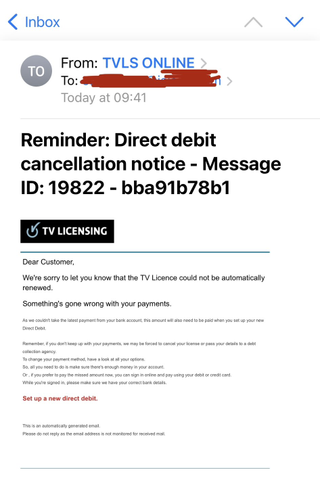TV licence scam warning: how to spot the latest fake emails
How TV Licence scam emails pressure you to part with your bank details


TV licence scam emails telling you that it’s time to renew or that your ‘direct debit has been cancelled’ agave been hitting inboxes again.
The latest scam emails use pressure tactics to cause a sense of panic when read to push you into taking action immediately.
Including more serious threats to rush you into making payments. Here’s what they look like and how you can avoid them
TV Licence scams
TV Licence scam emails

A TV licence scam email informing you of a ‘direct debit cancellation notice’ and claims your TV Licence ‘could not be automatically renewed’ due to something ‘going wrong’ with your payments.
Like many scam emails, this email uses convincing branding and even adds a ‘message ID’ number in an attempt to appear genuine.
The email informs you of a ‘direct debit cancellation notice’ and claims that your TV Licence ‘could not be automatically renewed’ due to something ‘going wrong’ with your payments.
It’s at this point that the more serious threats are made: if you don’t act quickly they may be ‘forced’ to cancel your licence or ‘pass your details to a debt collection agency’.
It’s these statements that the fraudsters are hoping will panic their victims into taking action. They want you to follow the email’s link to a fake website and enter your bank/card details.
Look After My Bills Newsletter
Get the best money-saving tips, tricks and deals sent straight to your inbox every week. Make sense of your money in partnership with The Money Edit.
How do I know if a TV Licence email is genuine or not?
If a communication you’ve received out of the blue is attempting to get you to take immediate action, treat it with suspicion. Take the time to look over the email carefully, noting the email address it was sent from and if the text feels generic.
If you’re unsure about an email you’ve received then do not follow any of its links. Instead, visit the organisation’s official website away from the email and log in to your account as normal and check for any issues.
If you’re still unsure, you can call TV Licencing on 0300 303 9695 to speak with someone who will be able to help.
A genuine TV Licencing email will address you personally, including your name or part of your postcode. If the email you’re looking at appears generic, it is likely to be a scam.
TV Licencing has an FAQ on scams which includes a downloadable booklet of advice on what to look out for:
I think I’ve been taken in by a TV Licence scam email: what should I do?
If you think you may have entered sensitive information, such as your bank/card details, into a third-party site you were taken to by a suspicious TV Licence email, you need to let your bank know what’s happened via its official channels ASAP.
Usually, you can report a scam and get your money back. Your bank should work with you to cancel your card, block any pending payments (if required) and refund the money you’ve lost.
You should also then keep an eye out for any follow-up scams that could occur if you’ve given contact details, such as your email address, postal address or phone number to fraudsters. Treat any contact you receive out of the blue with caution.
How can I report TV Licence scam emails?
Fake emails and phishing websites can be reported to the National Cyber Security Centre at report@phishing.gov.uk - action can then be taken to remove these websites.
If you’re also going to warn friends and family about a fake email, send them a screenshot - never forward the email directly.
A TV Licensing spokesperson said: “We work with groups across the UK to raise awareness of how people can avoid becoming the victim of a scam. Genuine TV Licensing emails and letters are personalised to include details such as your name, partial postcode or licence number. If anyone is suspicious or doubtful about whether the correspondence is genuine they can call us or check online.”
George is a freelance consumer journalist with a keen interest in scams and housing. He worked for the Consumers' Association for seven years where he was the editor of Which? Conversation - his work on exposing new scams saw him often quoted in the national press.
George has been at the forefront of the cladding and building safety crisis, campaigning for the rights of leaseholders and giving a voice to those caught up in the scandal - as a result he was nominated for Property Journalist of the Year in 2021 at the Property Press Awards.
-
 Three energy firms pay £8m in switching compensation - has your provider paid out?
Three energy firms pay £8m in switching compensation - has your provider paid out?More than 100,000 customers have received compensation after changing providers, but is now a good time to switch energy suppliers?
By Tom Higgins Published
-
 Save £300 on your supermarket shop with cashback accounts
Save £300 on your supermarket shop with cashback accountsBanks, credit card companies and cashback sites are all offering cashback on your supermarket shop, but can you use them all to max out your savings?
By Vaishali Varu Published
-
 Save on petrol: how to save 5p off a litre of fuel at Morrisons
Save on petrol: how to save 5p off a litre of fuel at MorrisonsPetrol prices may have been falling since last summer but every penny counts at the pump. Here’s how to save 5p a litre at Morrisons for a limited time
By Sue Hayward Published
-
 Morrisons relaunches discount scheme with cheaper prices for loyal shoppers
Morrisons relaunches discount scheme with cheaper prices for loyal shoppersMorrisons is the latest supermarket to revamp prices and offers for its loyalty scheme members
By John Fitzsimons Published
-
 Coronation freebies and discounts: what’s up for grabs
Coronation freebies and discounts: what’s up for grabsFrom free railcards and holiday giveaways to discounts off food, we highlight the special offers launched to mark the coronation of King Charles III
By Ruth Emery Last updated
-
 8 ways to get interest-free money if you’re struggling
8 ways to get interest-free money if you’re strugglingHere are 8 clever ways to get interest-free income if you’re struggling with the rising cost of living
By Vaishali Varu Last updated
-
 Best birthday freebies and discounts
Best birthday freebies and discountsEnjoy your special day with these birthday discounts and freebies - we highlight 22 of the best offers
By Vaishali Varu Published
-
 Festival ticket scam warnings – how to protect yourself
Festival ticket scam warnings – how to protect yourselfConcert ticket scams have rocketed by more than 500% over the past year, while festival fraud has more than doubled. Here’s how to keep yourself safe ahead of the festival season.
By Tom Higgins Published
-
 Co-op Member Prices: Supermarket unveils discount scheme for loyal shoppers
Co-op Member Prices: Supermarket unveils discount scheme for loyal shoppersNew Co-op scheme means reduced prices for shoppers who join the co-operative. How much does it cost to join, and how does it compare to similar schemes run by Sainsbury’s and Tesco?
By John Fitzsimons Published
-
 Emergency alert test: what to expect and how to avoid being scammed
Emergency alert test: what to expect and how to avoid being scammedWe tell you everything you need to know about the UK’s first emergency alert test, which takes place this Sunday
By Vaishali Varu Published